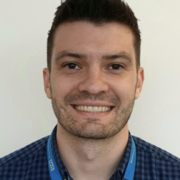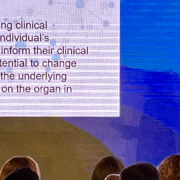Three career tips for clinical scientists: a conversation with Chris Watt
 Discover one professional’s journey into cancer genomics, plus top insights for newcomers in the field
Discover one professional’s journey into cancer genomics, plus top insights for newcomers in the field
Meet Chris Watt, principal clinical scientist at the North West Genomic Laboratory Hub (GLH) and practice educator at the Genomics Training Academy (GTAC). With a unique background in science and art, today Chris shares about his career journey, advice for newcomers and highlights from his work in cancer genomics training.
Q: Could you please tell us about your professional background?
I am a principal clinical scientist within the solid tumour team in Manchester and one of the GTAC’s practice educators. Art was always my passion growing up, so I completed a foundation year in art and design before deciding on a career in science. In 2012, I graduated with a first-class honours degree in human biology from Loughborough University, then completed a Master’s in medical diagnostics at Cranfield University. Prior to my current role, I worked as a research assistant in both haematology and genomics laboratories at the University of Cambridge. In 2017, I successfully gained a place on the genomics Scientist Training Programme (STP) at Manchester.
Q: What advice do you have for newer professionals in your field?
- Embrace your strengths and your limitations. One of the key lessons I have learned is to embrace your uniqueness! I have had quite a severe stammer since the age of four, which I always assumed would hold me back in my career. But over the last few years I have come to realise that everyone has their own strengths and limitations, and this diversity is absolutely crucial to team performance in a lab setting – and beyond.
- Work on your weaknesses. Focus on improving what you consider to be your weaknesses or areas requiring development. For me, this was the technical side of genomic testing because I hadn’t worked in the wet lab of an NHS genomic laboratory previously. Improving my understanding of assay principles and limitations has really helped me with my clinical role, for example, when troubleshooting.
- Pursue your passion. Find your special interest(s) within genomics. What makes you want to keep going and growing? Mine is the field of cancer genomics, particularly the training and education of the subject. Over time, you will likely see a pattern in what interests you most. Look for opportunities to continue developing in these areas.
Q: What has been a highlight with the GTAC so far, and what do you look forward to in the future?
My highlight with the GTAC so far has been collaborating with a wonderful group of professionals who all bring such a wide range of skills and expertise, with the shared goal of delivering high-quality training sessions and resources to the current and future generations of the genomics workforce. A project I have really enjoyed is the development of the upcoming ‘Introduction to Cancer Genomics’ training package for first-year STP trainees.
- What is the Genomics Training Academy? Learn more about the GTAC here









